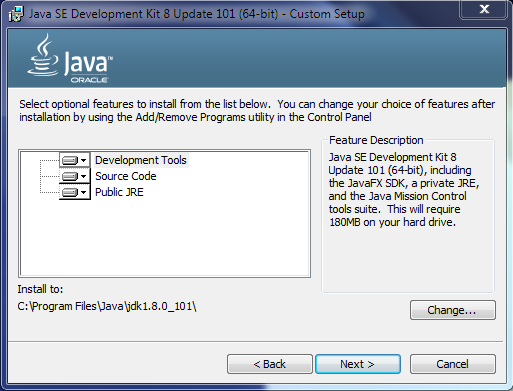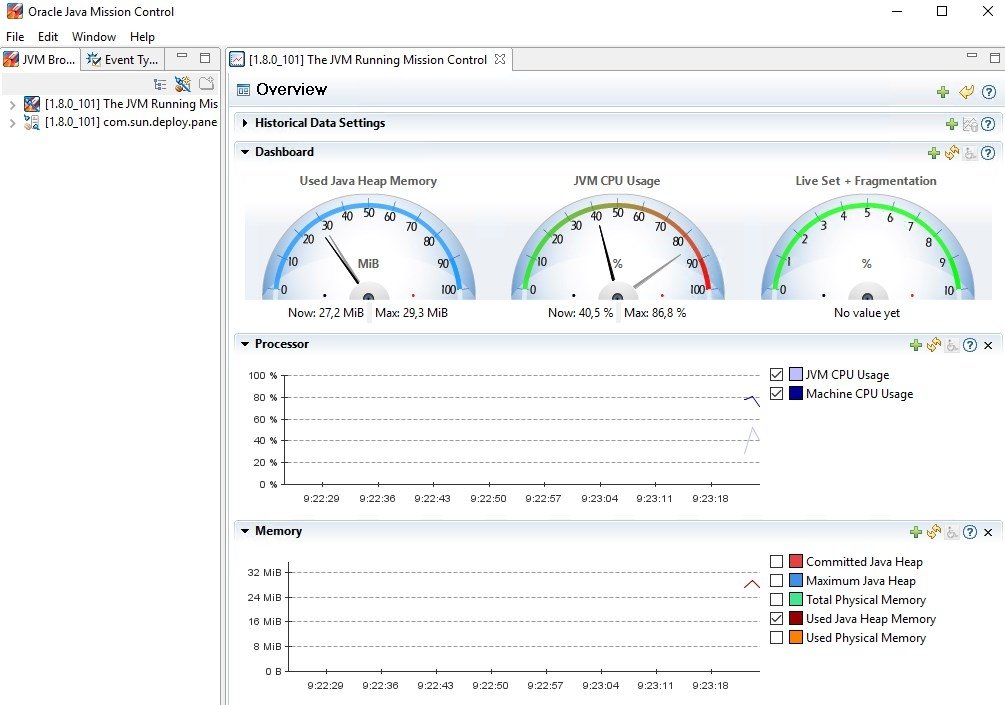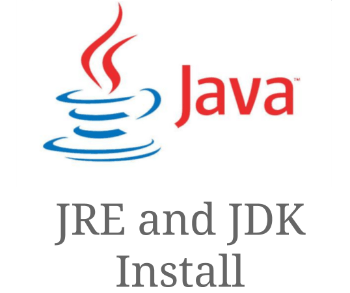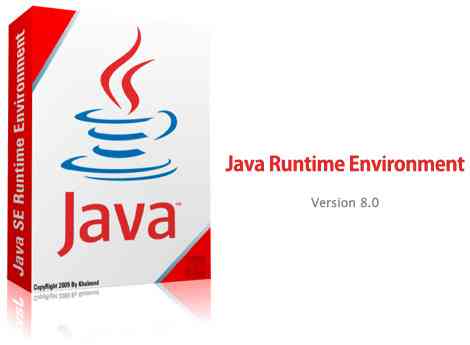Latest Version Java Runtime Environment (64bit) 8 Update 271 Old Versions Java Runtime Environment (64bit) 8 Update 261 Java Runtime Environment (64bit) 8 Update 251 Java Runtime Environment (64bit) 8 Update 241 Java Runtime Environment (64bit) 8 Update 231 Java Runtime Environment (64bit) 8.0.2210.11 Java Runtime Environment (64bit) 8.0.2110.12. We don't have any change log information yet for version 8-build-251 of Java Runtime Environment 32-bit. Sometimes publishers take a little while to make this information available, so please check back in a few days to see if it has been updated.
Java™ SE Development Kit 8, Update 101 (JDK 8u101)
July 19, 2016
The full version string for this update release is 1.8.0_101-b13 (where 'b' means 'build'). The version number is 8u101.
IANA Data 2016d
JDK 8u101 contains IANA time zone data version 2016d. For more information, refer to Timezone Data Versions in the JRE Software.
See JDK-8151876
Security Baselines
The security baselines for the Java Runtime Environment (JRE) at the time of the release of JDK 8u101 are specified in the following table:


| JRE Family Version | JRE Security Baseline (Full Version String) |
|---|---|
| 8 | 1.8.0_101-b13 |
| 7 | 1.7.0_111-b13 |
| 6 | 1.6.0_121-b09 |
JRE Expiration Date
The JRE expires whenever a new release with security vulnerability fixes becomes available. Critical patch updates, which contain security vulnerability fixes, are announced one year in advance on Critical Patch Updates, Security Alerts and Third Party Bulletin. This JRE (version 8u101) will expire with the release of the next critical patch update scheduled for October 19, 2016.
For systems unable to reach the Oracle Servers, a secondary mechanism expires this JRE (version 8u101) on November 19, 2016. After either condition is met (new release becoming available or expiration date reached), the JRE will provide additional warnings and reminders to users to update to the newer version. For more information, see JRE Expiration Date.
Certificate Changes
New DTrust certificates added to root CAs
Two new root certificates have been added:
- D-TRUST Root Class 3 CA 2 2009
- alias: dtrustclass3ca2
- DN: CN=D-TRUST Root Class 3 CA 2 2009, O=D-Trust GmbH, C=DE
- D-TRUST Root Class 3 CA 2 EV 2009
- alias: dtrustclass3ca2ev
- DN: CN=D-TRUST Root Class 3 CA 2 EV 2009, O=D-Trust GmbH, C=DE
See JDK-8153080
New IdenTrust certificates added to root CAs
Three new root certificates have been added:
- IdenTrust Public Sector Root CA 1
- alias: identrustpublicca
- DN: CN=IdenTrust Public Sector Root CA 1, O=IdenTrust, C=US
- IdenTrust Commercial Root CA 1
- alias: identrustcommercial
- DN: CN=IdenTrust Commercial Root CA 1, O=IdenTrust, C=US
- IdenTrust DST Root CA X3
- alias: identrustdstx3
- DN: CN=DST Root CA X3, O=Digital Signature Trust Co.
See JDK-8154757
Comodo Root CA removed
The Comodo 'UTN - DATACorp SGC' root CA certificate has been removed from the cacerts file.
See JDK-8141540
Sonera Class1 CA removed
The 'Sonera Class1 CA' root CA certificate has been removed from the cacerts file.
See JDK-8141276
Changes
other-libs/corba
Improve access control to javax.rmi.CORBA.ValueHandler
The javax.rmi.CORBA.Util class provides methods that can be used by stubs and ties to perform common operations. It also acts as a factory for ValueHandlers. The javax.rmi.CORBA.ValueHandler interface provides services to support the reading and writing of value types to GIOP streams. The security awareness of these utilities has been enhanced with the introduction of a permission java.io.SerializablePermission('enableCustomValueHanlder'). This is used to establish a trust relationship between the users of the javax.rmi.CORBA.Util and javax.rmi.CORBA.ValueHandler APIs.
The required permission is 'enableCustomValueHanlder' SerializablePermission. Third party code running with a SecurityManager installed, but not having the new permission while invoking Util.createValueHandler(), will fail with an AccessControlException.
This permission check behaviour can be overridden, in JDK8u and previous releases, by defining a system property, 'jdk.rmi.CORBA.allowCustomValueHandler'.
As such, external applications that explicitly call javax.rmi.CORBA.Util.createValueHandler require a configuration change to function when a SecurityManager is installed and neither of the following two requirements is met:
- The
java.io.SerializablePermission('enableCustomValueHanlder')is not granted by SecurityManager. - In the case of applications running on JDK8u and before, the system property
'jdk.rmi.CORBA.allowCustomValueHandler'is either not defined or is defined equal to 'false' (case insensitive).
Please note that the 'enableCustomValueHanlder' typo will be corrected in the October 2016 releases. In those and future JDK releases, 'enableCustomValueHandler' will be the correct SerializationPermission to use.
JDK-8079718 (not public)
security-libs/java.security
Support added to jarsigner for specifying timestamp hash algorithm
Java 8 Update 101 64 Bit Indir
A new -tsadigestalg option is added to jarsigner to specify the message digest algorithm that is used to generate the message imprint to be sent to the TSA server. In older JDK releases, the message digest algorithm used was SHA-1. If this new option is not specified, SHA-256 will be used on JDK 7 Updates and later JDK family versions. On JDK 6 Updates, SHA-1 will remain the default but a warning will be printed to the standard output stream.
See JDK-8038837
security-libs/javax.crypto
Java Version 8 Update 101 64 Bit Download
MSCAPI KeyStore can handle same-named certificates
Java SE KeyStore does not allow certificates that have the same aliases (http://docs.oracle.com/javase/8/docs/api/java/security/KeyStore.html).
However, on Windows, multiple certificates stored in one keystore are allowed to have non-unique friendly names. The fix for JDK-6483657 makes it possible to operate on such non-uniquely named certificates through the Java API by artificially making the visible aliases unique.
Please note, this fix does not enable creating same-named certificates with the Java API. It only allows you to deal with same-named certificates that were added to the keystore by 3rd party tools.

It is still recommended that your design not use multiple certificates with the same name. In particular, the following sentence will not be removed from the Java documentation: 'In order to avoid problems, it is recommended not to use aliases in a KeyStore that only differ in case.'
(http://docs.oracle.com/javase/8/docs/api/java/security/KeyStore.html)
See JDK-6483657
security-libs/java.security
DomainCombiner will no longer consult runtime policy for static ProtectionDomain objects when combining ProtectionDomain objects
Applications which use static ProtectionDomain objects (created using the 2-arg constructor) with an insufficient set of permissions may now get an AccessControlException with this fix. They should either replace the static ProtectionDomain objects with dynamic ones (using the 4-arg constructor) whose permission set will be expanded by the current Policy or construct the static ProtectionDomain object with all the necessary permissions.
JDK-8147771 (not public)
Bug Fixes
This release contains fixes for security vulnerabilities described in the Oracle Java SE Critical Patch Update Advisory. For a more complete list of the bug fixes included in this release, see the JDK 8u101 Bug Fixes page.
Known Issues
deploy
Java 8 Update 101
JRE 8u101 is not recognized by Internet Explorer (IE) when using static class ID
When a static class id is used to launch an applet or web start application while using JRE 8u101, users will get an unwanted dialogue box stating that they either use the latest JRE or cancel the launch even though they have installed and are using the latest JRE (JRE 8u101).
This specific case is only applicable on Windows and IE.
We do not recommend using static class id for JRE version selection (since JDK 5u6, Dec 2005) per http://www.oracle.com/java/technologies/javase/family-clsid.html.
Java 8 Update 101 64-bit Windows 7 Download
To work around this issue, users can do one of the following two things:
- Hit launch with the latest version (8u101) and ignore the warning.
- Install JRE 8u102 instead of JRE 8u101 to avoid this issue.
To address this issue, developers can do one of the following two things:
- Use a dynamic class id instead of static class id.
- Use java_version when using an HTML applet or a JNLP descriptor when using JNLP.

JDK-8147457 (not public)
Java Se Runtime Environment 64 Bit 1.8
ORACLE JAVA SE EMBEDDED DOWNLOADS
Oracle Java Standard Edition Embedded (Oracle Java SE Embedded) enables users to develop highly functional, reliable and portable applications for today’s most powerful embedded systems. The flexibility of the Java Platform enables users to develop secure, innovative products while achieving enhanced cost savings and accelerated time to market. Oracle Java SE Embedded provides a development platform for embedded devices that offers industry-leading reliability, performance, throughput, security and cross-platform support.
Java Version 8 Update 101 64 Bit 64
Devices having 11MB or more storage allocated for Java can apply compact profiles, Oracle's footprint reduced Java SE Embedded 8 products. Java SE Embedded 8 enables developers to create customized JREs using the JRECreate tool. To get started, download an eJDK bundle suitable for your target platform and follow instructions to create a JRE that suits your application's needs.
Devices having at least 70MB for Java can use the Oracle’s Java Platform, Standard Edition (Java SE) desktop and server computer products.
Starting with the 8u33 release, SE Embedded releases will no longer include PowerPC platforms. Both the 32-bit PPC platforms (e500v2 and e600) that were previously available, are no longer offered.
Java Version 8 Update 201 64 Bit
For more information please view the complete list of Java SE Certified System Configurations.
For non-embedded computers, download Oracle Java SE
Oracle Java SE Embedded Version 8 Update 101
Product / File Description | File Size | Download |
|---|---|---|
| ARMv5/ARMv6/ARMv7 Linux - SoftFP ABI, Little Endian 2 | 102.33 MB | |
| ARM v6/v7 Linux - VFP, HardFP ABI, Little Endian 1 | 114.65 MB | |
| x86 Linux Small Footprint – Headless | 115.7 MB |
- gcc options used include: -mfloat-abi=hard -mfpu=vfp
- gcc options used include: -msoft-float
Technical Information